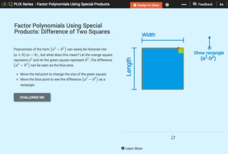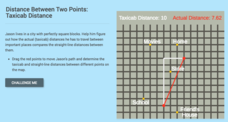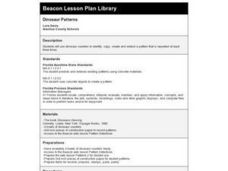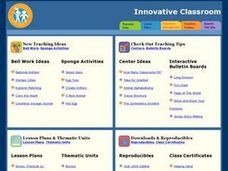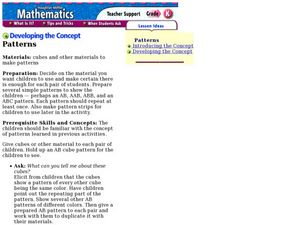University of Colorado
Are All Asteroids' Surfaces the Same Age?
There are more than 600,000 asteroids in our solar system. Pupils analyze images of two asteroids in order to determine if they are the same age. They count craters for each asteroid and compare numbers.
Los Angeles County Office of Education
Assessment for the California Mathematics Standards Grade 1
Here is an assessment designed to test mathematicians' knowledge of writing numbers, comparing numbers, skip counting, solving addition and subtraction problems; along with measuring objects, telling time, identifying shapes, reading...
Oddrobo Software
King of Math Junior
Do your students have what it takes to be the king of math? Find out with this fun skills practice game that covers a wide range of topics from counting and basic operations to measurement and fractions.
CK-12 Foundation
Zero, Negative, and Fractional Exponents: Patterns with Powers
Build a foundational understanding of exponent patterns. Young scholars manipulate the bases of exponent expressions. They discover the meaning of negative exponents through their exploration.
Virginia Department of Education
Balanced
Bring balance to your lesson plans with an activity that asks individuals to solve one-step linear equations with inverse operations. Balance scales help learners understand the concept of isolating the variable.
Curated OER
Learning 3 - Write the Number
Do this for numbers 1-10, but in this one youngsters just focus on the number three. First, they trace the digit three times (of course!) and try a few on their own. Next, scholars count how many bears, bowls, and beds there are, writing...
Jolly Learning Ltd
Cartoonito Activity Sheets
The snake goes sssss and the plane goes nnnnn! Practice letters and their sounds with a collection of activities. For each letter, kids get to color, practice the sound, and practice writing the letter. This is group one. See the...
Space Race
Sensory Detectives
Test your learners' sensory awareness with three hands-on activities that ask pupils to use their other senses to identify and describe everyday objects hidden from sight.
EngageNY
Numbers Raised to the Zeroth Power
What in the world is the zeroth power? Examine the patterns of exponents as they apply to the zeroth power. Scholars apply the zero property to simple exponential expressions in this fourth lesson in a series of 15. The examples include...
DK Publishing
Learning 4 - Write the Number
Focus on fours! First, young counters trace the number four (in numeral form) three times and print a few on their own. Next, they count Little Bo Peep's groups of sheep, recording each total. There are four of each, but encourage them...
CK-12 Foundation
Factor Polynomials Using Special Products: Difference of Two Squares
Factoring patterns are not magic! Show your classes how to model the difference of two squares' factors using an area model. Learners manipulate the width and length of two squares to represent the polynomial a^2-b^2. They use the model...
CK-12 Foundation
Distance Between Two Points: Taxicab Distance
Apply geometry to find the distance as the crow flies. An engaging lesson compares the distance a car must drive to the straight line distance between two locations. Scholars must manipulate a simulation, note the change in distances,...
CK-12 Foundation
Patterns and Expressions: Cookie Jars
It's okay to get caught with your hand in a virtual cookie jar. Pupils use an interactive to drag cookies from two cookie jars onto a plate. They investigate how an expression representing the number of remaining cookies changes as users...
Curated OER
Color By Number
Math pages that involve coloring are fun and can help children differentiate patterns or specific information. They compute single-digit addition problems that result in sums from 10 to 15. Odd numbers are colored red and even...
Curated OER
Letter Patterns
Second graders look at the number patterns we get from letters and numbers. They keep track of the numbers involved by drawing up a table of values. It's important here to look for the pattern and see how the number of tiles changes from...
Curated OER
Pede Patterns
Students generate number patterns for certain 'insects' from the mythical planet of Elsinore. Each 'Pede' is made up of square parts and has a number of feet. The patterns all link the number of feet and the number of squares. The...
Curated OER
Patterns on Parade
First graders discover that patterns exist in sounds, movement, and objects. In this patterns lesson, 1st graders select two items from a group and produce an alternating pattern.
Curated OER
Extending Geometric and Numeric Patterns
Young scholars study patterns. They construct growing patterns using pattern blocks and isosceles right triangles. They verbally describe the patterns and state the rule that describes the relationship involving the number of pattern...
Curated OER
Repeating Patterns
Students explore growth patterns by using manipulatives such as pattern blocks, investigate growth pattern of pattern, record growth in T-chart, describe how pattern is growing, and predict number of blocks needed to extend pattern.
Curated OER
Addition Patterns
In this addition patterns worksheet, students respond to 7 questions that require them to fill in the missing numbers in 7 patterns and then describe each of the patterns in their own words.
Curated OER
Dinosaur Patterns
Students listen to story Dinosaurs Dancing, use dinosaur counters to identify, copy, create and extend pattern that is repeated at least three times, and complete web lesson.
Curated OER
Complete The Pattern
Learners are introduced to various geometric and numeric patterns. In groups, they work together to determine the next object or number in the pattern. They record their answers on a worksheet and create their own pattern to give to a...
Curated OER
Macaroni Pattern Necklaces
Students create a macaroni necklace based on a pattern given them by the instructor. In this reinforcement lesson plan, students are given a complex pattern and using a letter key. They must recreate the patten using colored macaroni...
Curated OER
Developing the Concept: Patterns
Students understand what a pattern is and how to make a pattern. In this pattern lesson, students use cubes to create various patterns. Students recognize the pattern created.
Other popular searches
- Geometric Number Patterns
- Extending Number Patterns
- Fibonacci Number Patterns
- Math Number Patterns
- Number Patterns Worksheets
- Odd and Even Number Patterns
- Number Patterns in Math
- Ab Number Patterns
- Looking for Number Patterns
- Recognizing Number Patterns
- Number Patterns and Sequences
- Patterns Hundred Chart










